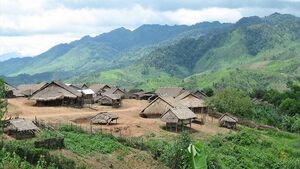Crown Company Incident: Difference between revisions
No edit summary |
No edit summary |
||
| Line 42: | Line 42: | ||
}} | }} | ||
The '''Crown Company Incident''' or the '''Hue Ngãi Conflict''' (15 June - 1 July 1945) refers to the series of infighting between the Bethausian and Free Quenminese members of [[Special Operations Executive (GL)#Crown Company | The '''Crown Company Incident''' or the '''Hue Ngãi Conflict''' (15 June - 1 July 1945) refers to the series of infighting between the Bethausian and Free Quenminese members of [[Special Operations Executive (GL)#Crown Company; Special Air Service|Crown Company]]. The incident was the result of the controversial [[Bloody Highway]], a series of mass murders committed by the [[Free Bethausian Army of the East]] during the [[Central Highlands Campaign]]. | ||
The incident at Hue Ngãi is one of the most controversial events that took place in the Allied side during the [[Second Europan War]]. It was considered by Major [[David John Blazkowicz]], the commander of Crown Company, as one of the climax of the [[Summer Strife]], the Free Quenminese response to the murders committed by the Free Bethausian forces. A series of skirmishes between the two sides took place between 15 until 23 June. | The incident at Hue Ngãi is one of the most controversial events that took place in the Allied side during the [[Second Europan War]]. It was considered by Major [[David John Blazkowicz]], the commander of Crown Company, as one of the climax of the [[Summer Strife]], the Free Quenminese response to the murders committed by the Free Bethausian forces. A series of skirmishes between the two sides took place between 15 until 23 June. | ||
Revision as of 15:12, 25 August 2021
This article is incomplete because it is pending further input from participants, or it is a work-in-progress by one author. Please comment on this article's talk page to share your input, comments and questions. Note: To contribute to this article, you may need to seek help from the author(s) of this page. |
| Crown Company Incident | |||||||
|---|---|---|---|---|---|---|---|
| Part of Bloody Highway during the Second Europan War | |||||||
 Hue Ngãi Village, where the incident of Crown Company happened. | |||||||
| |||||||
| Belligerents | |||||||
| Commanders and leaders | |||||||
| Strength | |||||||
| at least 150 troops |
approx. 120 Free Quenminese troops | ||||||
| Casualties and losses | |||||||
|
35 killed or wounded |
39 killed or wounded | ||||||
The Crown Company Incident or the Hue Ngãi Conflict (15 June - 1 July 1945) refers to the series of infighting between the Bethausian and Free Quenminese members of Crown Company. The incident was the result of the controversial Bloody Highway, a series of mass murders committed by the Free Bethausian Army of the East during the Central Highlands Campaign.
The incident at Hue Ngãi is one of the most controversial events that took place in the Allied side during the Second Europan War. It was considered by Major David John Blazkowicz, the commander of Crown Company, as one of the climax of the Summer Strife, the Free Quenminese response to the murders committed by the Free Bethausian forces. A series of skirmishes between the two sides took place between 15 until 23 June.
By the last day of the infighting in the village, Blazkowicz, after exhausting all efforts to calm both sides, decided to take action by sending ERUAC, Gallian, and Jutlander troops of Crown Company to arrest both Bethausians and Free Quenminese, with Blazkowicz personally arresting Zeyar and Tuyết. Blazkowicz had the two of them court-martialed along with 270 who participated in the infighting. The 270 participants, both Quenminese and Bethausian were found guilty. Its leaders, and other NCOs were sentenced to death by firing squad, with Tuyết being the first to be given a death sentence. However, Blazkowicz objected to the sentence and requested the court for a 5 day appeal, which was granted.
To reverse the court's decision, he made an appeal to Lord Mountbatten, who accepted the appeal and intervened. 150 participants, including the two commanders were demoted while the remaining were acquitted on the grounds of medical duties during the events. Both Tuyết and Zeyar were restored to command prior to Crown Company's assignment to Kontin. Both were able to settle their differences after the war.